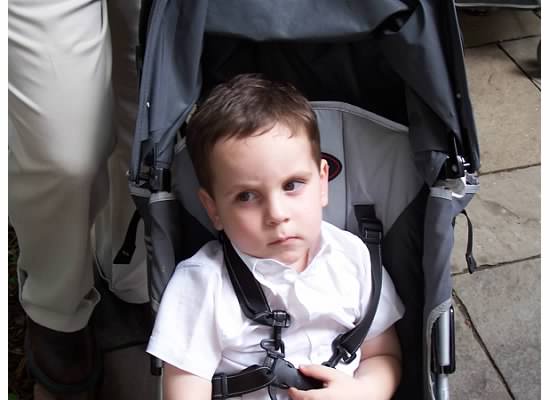Yes, I Have ‘Resting B*#ch Face’ And So Does My Kid. What’s It To You?
Oh, here we go.
The New York Times Style section has identified yet another trend-you-love-to-hate, and it’s the so-called “resting bitch face,” or the way some of us (in the case of the article, surprise! it’s women) have faces that naturally, at rest, appear to be not so friendly! The piece is titled I’m Not Mad, That’s Just My RBF in the online version, but in the paper it’s headed Cursed with a Death Stare, which is pretty funny to me personally, as “Death Stare” is what my own resting face has often been called (sometimes with fascination, sometimes with fear, often with judgment).
Trend. Huh. I’ve been dealing with this my whole life. And about 10 years ago, when my now-nearly-teen was a toddler, he started getting the “why isn’t he smiling?” questions. I wouldn’t say my boy has b*#ch face, but he does tend, when not actively smiling, to have a naturally furrowed-slash-worried look.
The Times piece, after my boiled blood settled down somewhat, jogged my memory: Around the time my boy started getting the “smile sweetie!” admonitions on the street, I wrote about it.
Never did sell the essay that came of it, but I thought I’d share now. My thoughts 10 years ago are the same as they are now:
“Hey, smile, kid, it can’t be that bad!”
We were walking near the Mall in Washington, DC, on a murderously hot day in July. My son, Daniel, two-and-a-half at the time, was in his stroller, and I was glad he was quiet and content—we were heading back to our hotel to get ready for my brother’s wedding. I was hoping he’d doze off to store up some energy for the long evening ahead. Daniel has an enviable ability to zone out when he wants, so even if he wasn’t going to drop off, he would, I knew, at least descend into that quiet, contemplative place he goes. But sure enough, a passerby—meaning no harm, naturally—took a look at my boy’s composed, serious face, and took him for sad, or mad, or worried. It happens all the time.
My boy has his dad’s high, expressive forehead, my round, greeny-brown eyes, and a small, bow mouth whose origins I can’t trace. When he’s not smiling or laughing, when his face is simply in repose, it’s true he can look worried. He even has toddler-size worry furrows near his eyebrows. If you think he looks like he’s deep in thought, that he’s working something out in his head, that’s probably what he’s doing. But he’s not sad. He simply keeps his happy tucked away on the inside.
Just like I always did.
If I had a chocolate bar for every time someone said to me on the street—from the time I was Daniel’s age to present day—some variant of “cheer up, it might never happen!” or, “Smile, sweetie. What’s wrong?” I’d have, well, a big pile of chocolate bars. And it has always bugged me, for a couple of reasons. First, a stranger’s comment would break me out of my no-one’s-talking-to-me-right-now reverie. I might have been in the middle of telling myself a great story. Second, it always felt so… pushy. I should smile? Why? Because you want me to?
When I was a child, I took those comments to heart. Back in the eighth grade, I had an English teacher, Mrs. Jaye, who must have just taken some sort of sensitivity training. How to Spot the Students Who are Having Trouble At Home, or somesuch. She kept me after class more than once, leaning down into my face to ask me “if everything was alright.” Because? “Because you never smile.”
I told my dad. Who snorted. “Tell her you’re a deep thinker,” he said.
The funny thing is, I actually am a pretty happy person. I have my moments, like everyone else, but I’ve known some serious melancholics, and I’m not one of them. I just don’t smile without a darned good reason.
But back to my kid: Why should he smile all the time? When he bestows his beaming grin, it’s genuine, nonpolitical, and (to me) heart-stopping, complete with a flash of a now-you-see-it, now-it’s-gone dimple. Otherwise, you get his regular face, which, obviously, makes some people uncomfortable. And that’s what I believe is behind the exhortations to “smile sweetie!”
The world, not the non-smiler, will be more at ease if you smile. To which I tell the world: Deal with it.
Not long ago, I was sitting in a conference room at a soon-to-be-former job. Our boss—the honcho who ran the division I worked for–was giving us the news that our jobs would soon be history. Trying to be polite and professional, I kept my gaze on her face as she spoke. Seemed brighter than doodling on my legal pad or snickering into my hand. Later, I heard from my immediate supervisor that Mandy (not her real name) was “uncomfortable with the way you were looking at her. She thought you were giving her a death stare.” A what? What would she have preferred? A beneficent smile? A twinkly grin? She was firing us! And I was supposed to smile at her to make her feel better about her task? I wasn’t giving her a death stare. I was just, you know, looking at her.
And that’s all my son is doing. His baby brother, with his drool-slick chin and 3 ½ teeth, is much more of a grinner. He gives it away to everyone who’ll look at him sideways. His whole face crinkles up into smiles at the slightest provocation. Lucky him; the world will love him. As for me and Daniel, well, I should have t-shirts printed up: The wearer of this t-shirt is a happy person. Just please, don’t ask me to smile.

